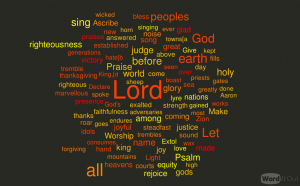If this is your first viewing, please see my Introduction before reading this, and the introduction to the Psalms for this book of the Bible in particular.
15 July. Psalms 96-102
I noted yesterday that Psalm 90 invites us to consider how God is timeless, making no distinction between the most ephemeral and most long-lasting things in creation. If that is so, then he is also sizeless, intimately involved with the complexity of the world at its miniscule scale, as well as a cosmic level.
That is not obvious from Psalms 96 to 100. The Lord is understood here to be a powerful being totally in control of the world, though somewhat detached from it in his “sanctuary” or “courts”. This is understandable when you remember that the composers of these songs lived in a world with sharp division between rulers and ruled, and with a not unreasonable assumption that the world was at the centre of God’s creation. Despite massive shifts in politics and science in the last 3000 years, many people’s understanding of God is still of “him up there”. But many thinking Christians would now reject the notion of God being physically remote from the world, rather he (or s/he if you prefer) is “here and now” – always and everywhere.

The other thing to note about these psalms (96-100) is that they are all songs of praise to God, with hardly a hint of personal problems (unlike 102, or many of the other psalms). This word cloud worditout.com/word-cloud/2299907 shows that Lord, God, earth, peoples, praise, and righteousness are the most commonly used. Sometimes we have to set aside our problems and devote ourselves to positive activities such as singing (including praising God) or giving attention to other people (showing practical love). For people of faith, that is not just about a feel-good factor or boosting endorphins, it is connecting with the ever-present God.